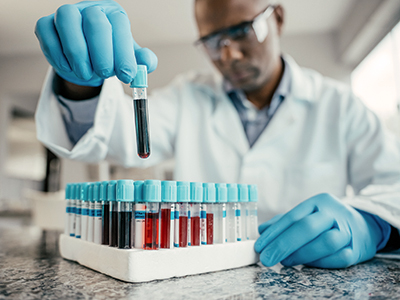
Using advanced technology to analyze simple blood tests, researchers have identified indicators of disease to guide treatment decision-making.
A study published in Nature Medicine has uncovered biomarkers that could help select the most effective precision treatments for patients with late-stage prostate cancer. Led by Vancouver Coastal Health Research Institute researcher Dr. Alexander Wyatt, a key advantage of the approach is that it can be performed using a simple blood test.
“Ultimately, this work helps move us closer to true precision oncology — matching the right treatment to the right patient at the right time,” states Wyatt.

The research team leveraged advanced genomic techniques developed at the Vancouver Prostate Centre to analyze blood samples from 180 individuals with aggressive prostate cancer enrolled in a randomized clinical trial. Individuals included in the trial were treated with either a radioligand therapy called Pluvicto or a standard chemotherapy known as cabazitaxel.
Pluvicto, also known as lutetium-177 vipivotide tetraxetan, is a new radioligand therapy that targets the PSMA protein commonly found on prostate cancer cells, attacking and destroying them with radioactive materials called radioisotopes. The treatment is administered to patients with metastatic prostate cancer whose cancer has spread to parts of the body outside of the prostate gland.

“Year over year, we are seeing more patients with treatment-resistant prostate cancer.”
While not all prostate cancers respond to Pluvicto, when it works, the results can be dramatic. However, Pluvicto carries with it the risk of serious side effects, such as low blood cell counts and kidney problems, making it particularly important to give only to patients likely to benefit from the treatment. Additionally, the radioactive properties of Pluvicto make it more costly to procure and more difficult to store and handle.
“Pluvicto can be quite effective in some patients, stressing the need to find biological markers that can help determine which patients will benefit most from Pluvicto and which should receive a different treatment instead,” Wyatt says.
Cabazitaxel chemotherapy works by hampering cancer cell division; however, it also affects other cells in the body and can lead to negative side effects of its own, such as chest pain, bowel conditions and tiredness.
Making gains toward precision oncology
Researchers used an advanced genomic sequencing technique developed at the Vancouver Prostate Centre to reconstruct the genome of prostate cancer DNA. They also measured the amount of cancer DNA circulating in the blood of participants both before and after they were treated with either Pluvicto or cabazitaxel.
The goal was to identify genetic mutations in the cancer DNA that could be linked to cancer behaviour, illuminating biomarkers of disease to aid in matching metastatic disease with the best possible treatments.

“We developed a next-generation circulating tumour DNA test with an advanced design and computational tools to deliver higher-resolution information.”
Researchers discovered that all patients with low levels of cancer DNA in their blood — called circulating tumor DNA (ctDNA) — before treatment responded significantly better to Pluvicto than to cabazitaxel. This finding was demonstrated by a drop in patients’ prostate-specific antigen counts, which are key markers of prostate cancer activity in the body.
“Our technology could also assist with adaptive dosing, modulating treatment based on how the cancer is responding to optimize killing cancer cells while limiting radiation exposure.”
Patients who were treated with Pluvicto and who had low levels of ctDNA also experienced longer periods of controlled disease, averaging 14.7 months versus only six months among patients with low levels of ctDNA treated with cabazitaxel. By contrast, patients with high ctDNA levels did not respond well to either treatment.
Researchers also noted several genetic markers that impacted treatment effectiveness.
“Patients with mutations in their PTEN tumour-suppressor gene — found naturally in the body — did worse with cabazitaxel than with Pluvicto, suggesting that Pluvicto may be the better choice in this group, but further study is needed,” says Wyatt.
“Additionally, patients with ATM gene mutations had exceptional responses to Pluvicto, including very long remissions, hinting at a potential new biological marker for treatment selection.”
Less clear was whether genomic mutations contributed to why some cancers did not respond to either treatment. “Treatment-resistance appeared to come from more complex shifts in the cancer cell population, rather than any one genetic change,” Wyatt concludes.
To further validate their findings, Wyatt and his team are presently conducting a follow-up study involving a larger cohort of patients from Canada as well as from Australia.
“Importantly, our research so far provides a framework for using blood-based markers to guide the use of targeted therapies in prostate cancer and possibly other cancers in the future.”


